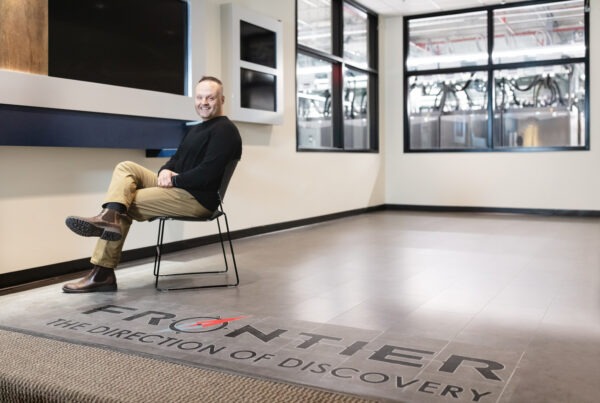
OLCF Outreach science writers Eric Gedenk (left) and Jeremy Rumsey (right) pose with former science-writing intern Christie Thiessen (middle). Both Gedenk and Rumsey began their careers as science writing interns at the OLCF and benefited from the learning experience.
The Oak Ridge Leadership Computing Facility (OLCF), a US Department of Energy (DOE) Office of Science User Facility, is in the business of solving the nation’s most vital scientific problems with its supercomputers. At the same time, the OLCF has an opportunity to help develop the nation’s next generation of science and technical communicators through its internship program.
For the past 9 years, the OLCF Outreach team has offered a science-writing internship; to date, 15 interns have participated. The internship has paid dividends for both its participants and the organization, establishing a track record for preparing students for their professional careers. Investing in these students has led to great outcomes for DOE and DOE’s Oak Ridge National Laboratory (ORNL), where the OLCF is located.
“For somebody who is an aspiring science writer, this place was obviously the gold standard to get further training that you wouldn’t get at a university,” said Eric Gedenk, a former intern who returned to OLCF as an Outreach science writer in November 2014. “You’ve got world-class caliber writers here. You’ve got world-class caliber researchers here. There’s not a place in 200 miles in any direction where you could get this kind of experience writing about science.”
While researching and writing about OLCF technical innovations and the scientific accomplishments of OLCF users, interns learn to translate complex research in a way that effectively informs a general audience.
“At ORNL, you write about so many cool things about science and technology that you wouldn’t find out about anywhere else,” said Christie Thiessen, the latest student to complete the science-writing internship. “The work here has the potential to change lives for millions of people and should get a spotlight to show its worth. It’s hard sometimes but so fascinating that you learn to persevere and write about it in an understandable way for policymakers and the public. In the process, you learn to dissect the complex understanding of research into more accessible information.”
As part of the writing process, interns also learn the art of interviewing. For Jeremy Rumsey, a former intern who became an Outreach staff writer in April 2015, this skill continues to provide benefits.
“The ability to ask a good question is worth its weight in gold,” Rumsey said. “Not only did I learn what kinds of questions to ask, but more importantly, how to ask them. Researchers can sometimes throw you breaking balls, meaning some fall short of being good communicators. Very quickly, I learned that if I’m going to get the information I need from them, I’d need to be prepared to ask the same questions a number of different ways. Being resourceful, by the way, is a necessary quality to have.”
For most science-writing interns, being resourceful means admitting ignorance in a seemingly intimidating environment.
“There’s such a big drive to feel informed, but here, in a place where you’re surrounded by top scientists, you are often going to be the least educated,” Thiessen said. “It’s an important skill for writers, and it’s important for everyone, to be upfront about confusion and ask questions so you do actually understand. It’s better to be uninformed and get smart than to look smart and stay uninformed.”
Interns don’t face these doubts and challenges alone. At the OLCF, surrounded by supportive mentors, helpful science writers, and knowledgeable OLCF staff and researchers, interns work in an environment conducive to learning and developing their skills. Former intern Sandra McLean fondly remembers one scientist who spent an hour discussing the background of his research area—not even his own research—so she could complete an assignment.
McLean admits that, if not for her OLCF internship experience, she probably wouldn’t have applied for DOE’s Pathways Program, which greatly aided her in obtaining her current position as a communications specialist at the Office of Communications and Public Affairs in the Office of Science at DOE in Washington, DC.
For many students, the OLCF internship is a unique experience. Rumsey began his internship in the summer of 2012, just in time to see Titan—then the world’s most powerful supercomputer—go live that November. As an intern, he followed and wrote about its groundbreaking deployment, uncharted challenges, and eventual rewards. He currently works as a matrixed employee writing for the OLCF, the Neutron Sciences Directorate, and ORNL’s Compute and Data Environment for Science.
Working alongside other science writers helped both McLean and Gedenk realize that they could do the work, make a difference, and feel fulfilled pursuing science writing as a career.
“My internship at the OLCF gave me the confidence to write about some of the world’s biggest scientific challenges in an effective, informative way,” Gedenk said. “Thankfully, since I’ve been hired as a staff writer, that is my job description every day.” —Miki Nolin
Oak Ridge National Laboratory is supported by the US Department of Energy’s Office of Science. The single largest supporter of basic research in the physical sciences in the United States, the Office of Science is working to address some of the most pressing challenges of our time. For more information, please visit science.energy.gov





